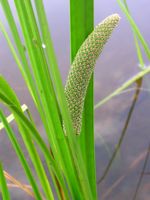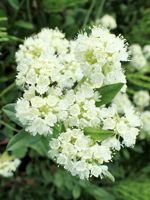Mon-Fri 9am - 5pm Mountain time
American Sweet Flag vs Sulphur-Flower Buckwheat
Acorus americanus
Eriogonum umbellatum
CUSTOM GROW
CUSTOM GROW
American Sweet Flag is a native perennial wetland plant found along shorelines, streams, wet meadows, and marshes. Its extensive rhizome system allows it to spread and stabilise soil, helping maintain the edges of ponds and streams. This dense growth provides cover for small animals and supports overall wetland biodiversity, while the rhizomes and seeds serve as food for small mammals and waterfowl. Cold-hardy and resilient, it is well-suited for ecological restoration, riparian plantings, erosion control, and naturalization projects.
The plant grows in dense clumps with tall, sword-shaped leaves that release a citrus-like scent when bruised. The rhizomes are aromatic, with a spicy, cinnamon-like fragrance that has been used in perfumery and flavouring. In early summer, American Sweet Flag produces a distinctive floral spike (spadix), adding visual interest to wetland plantings.
Sulphur-Flower Buckwheat is a native perennial wildflower known for its dense clusters of cream to yellow flowers. The long-lasting blooms persist from late spring into summer, providing an extended nectar source for a variety of pollinators. The flower buds are often red-tinted before opening. As the blooms age, they shift to orange or red, adding seasonal interest and making them well-suited to dried flower arrangements. Its seeds are also eaten by birds, adding to its ecological value.
Depending on climate and conditions, Sulphur-Flower Buckwheat may be evergreen to semi-evergreen, or its foliage may turn red during fall. Its deep roots and spreading growth stabilize rocky or sandy soils, making it useful for erosion control. Exceptionally hardy once established, it requires little care and thrives in challenging environments, making it an excellent choice for pollinator gardens, naturalization, and ecological restoration projects.

